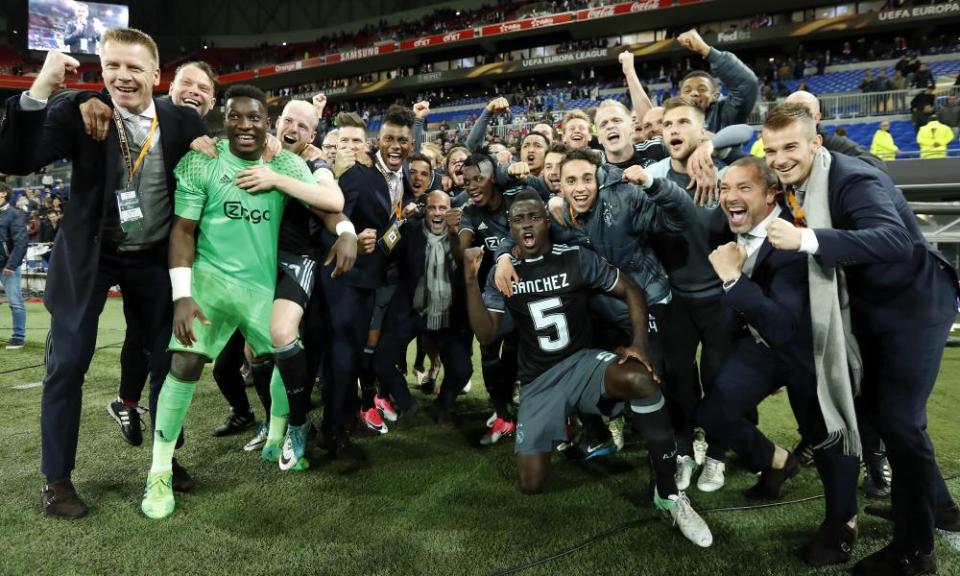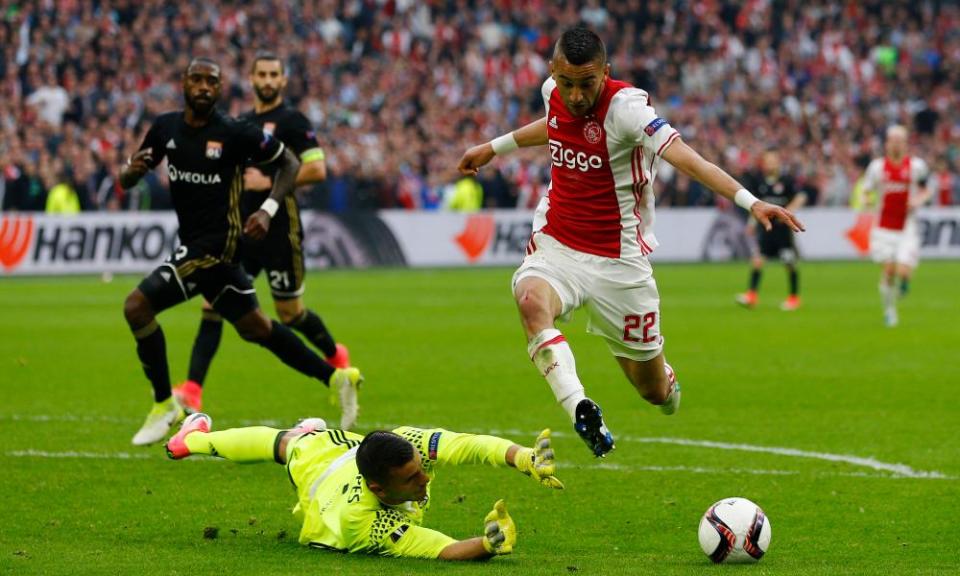Ajax’s thrilling revival under Peter Bosz delivers on Johan Cruyff’s vision

The central figure in the Europa League final will be the man who is most profoundly absent: Johan Cruyff. The former player, coach and guru died 14 months ago but the thrilling young Ajax side who have emerged in the past couple of months are built in his image and according to his principles.
There are few precedents for the speed, scale and significance of the team’s transformation. Last August, Ajax lost 4-1 to Rostov in a Champions League qualifier with a dire performance that seemed to confirm the once-great Dutch club’s irreversible decline and as recently as last month, the notion Ajax were about to sweep to their first European final since 1996 would have seemed absurd.
But the manager, Peter Bosz, in his first season, had been slowly building something remarkable. The first sign something was afoot came in a stunning victory in the first leg of their quarter-final against Schalke six weeks ago. “It was like watching the 1974 World Cup team,” says Auke Kok, Cruyff’s biographer. “I never thought I’d see an Ajax team playing this way again.”
Ajax won 2-0 but could have scored six and the ferocity of their pressing and daring use of a high offside line to pen back their opponents was reminiscent of total football. “No one could quite believe what we were seeing and there was a feeling in the stadium which was almost non-Dutch and non-Ajax, as if the people and players became one body. It was intimidating and an emotional release from the fans who’d been watching disappointing, boring games for too long.”
Almost as impressive was the fighting spirit that saw Ajax recover from near-disaster in the second leg. Schalke scored three goals before Ajax rallied and scored twice near the end to reach the last four.
The semi-final against Lyon followed a similar pattern: a stunning home victory – this time 4-1 – followed by a wobble in the second leg, staved off with surprising resilience as Ajax won 5-4 on aggregate.
Many outsiders will assume Ajax have found their new team by simply and serenely doing what they always do – nurturing young talent – but that is not what happened. Many of the key players, such as the Colombian defender Davinson Sánchez and Moroccan midfielder Hakim Ziyech, arrived only this season.
More importantly, the new Bosz is not the same as the old boss. Under the previous manager, Frank de Boer, Ajax won four successive Dutch titles but, so devout was his attachment to his mentor Louis van Gaal’s principles of possession and patient buildup, the team sometimes took 20 minutes to manage a shot on goal.
The club’s recent history has also been tumultuous. In 2011, frustrated by years of mediocrity, Cruyff led a group of former players who forced out the old management. Unfortunately, this “Cruyff Revolution” followed the pattern of the French and Russian ones. With the old regime gone, the insurrectionists turned on each other and supporters of Cruyff battled those of Van Gaal.
Even by Dutch football standards, the dispute was bitter. Lawyers got involved, lifelong friendships were broken. In part the conflict centred on a personality clash – Cruyff and Van Gaal loathed each other – but there was also a philosophical issue going back to the time Cruyff and his coach Rinus Michels co-created total football in the early 70s.
Cruyff and Van Gaal both loved the spatially sophisticated attacking football on which the club’s reputation rests but there were crucial differences. Following Michels, Van Gaal put his faith more in systems and rigid application of tactics. Cruyff believed in giving the most talented players freedom within a looser tactical structure.
In 2011 Cruyff, who wanted top former players to run the club, triumphed but his followers soon fell out and his favourite, Wim Jonk, was eventually sacked by his former friends.

In late 2015, Cruyff was diagnosed with lung cancer. His last public appearance, two weeks before he died, came in a short video and photographs taken in Israel with his son Jordi, the technical director of Maccabi Tel Aviv. Largely unremarked on at the time was the fact that Bosz, then the Maccabi manager, was also present.
Cruyff’s death on 24 March triggered a huge outpouring of emotion in the Netherlands, where he was celebrated mainly for his achievements as a player. Commentators stayed tactfully silent about the “revolution” which they saw as a blemish on his career.
It seems Cruyff never gave up on his dreams for Ajax and those last pictures have since acquired a new resonance. Bosz had long admired Cruyff. His other main influence was Pep Guardiola, Cruyff’s protege and disciple.
Likewise, Jordi and Johan Cruyff were fans of Bosz, mainly because of the attacking football his teams played when he was the manager of Heracles and Vitesse Arnhem in the Netherlands.
For two years Jordi tried to persuade Bosz to join him at Maccabi and, in January last year, he got his man. The idea the appointment might be a stepping stone back to the Netherlands was written into the contract. Bosz would return home to manage Ajax if the Amsterdam club wanted him.
We do not know if Jordi, or indeed Johan, suggested Bosz to the Ajax directors, or if his talents fitted with their desire for attacking football. Either way, after the popular De Boer chose to leave – eventually joining Internazionale for an ill-fated spell – Bosz got the job.
It is now clear that in early March 2016 Bosz had a transformative experience. He and Cruyff spent a week talking. We don’t know exactly what was said but, as Bosz said: “In one week I learned enough for 10 years.”
He now cites Cruyff constantly and has been putting his ideas into practice. Ruud Gullit was among those who warned that pursuing romantic Cruyffian ideas was doomed to fail in modern football. Bosz persisted and has slowly taught his team to play the aggressive pressing game we tend to associate with Guardiola and Jürgen Klopp, but which originated with Cruyff in the Ajax and Holland teams of the 70s.
Like Cruyff, Bosz gives his players confidence to take risks and urges them to play hard, be creative and express themselves. The flowering of players under his tutelage has been remarkable. Sánchez, only 20, is rapidly maturing into a defender with the authority and charisma of Velibor Vasovic, the tough Serbian captain of Ajax in the late 60s and early 70s.
Davy Klaassen, who had previously struggled in the role of prime creator, has been reborn as a combative midfielder and team leader. André Onana, once considered a calamity-prone reserve goalkeeper, has become sensational. The defenders Nick Viergever and the 17-year-old Matthijs de Ligt have both improved to an astonishing degree.
All through the team, the progress of each individual seems to inspire the others and contribute to the whole. The new creation is still fragile and this new Ajax could easily lose to the more experienced Manchester United, but off-field finances probably pose a greater danger to their development.
After helping Ajax win the Champions League in 1995, Jari Litmanen famously urged his fellow players to keep the team together. They ignored him and the best young side of the decade soon disintegrated.
This month the club’s bewitching new midfield star, Ziyech, made the same plea. It probably will not work. The lure of bigger, richer clubs will surely draw away many if not all of Ajax’s crop of young stars.
For now though, whatever happens against United on Wednesday, Ajax have something extraordinary to celebrate: a return to their roots, and the posthumous vindication of the greatest figure in their history.

 Yahoo Sport
Yahoo Sport 





































